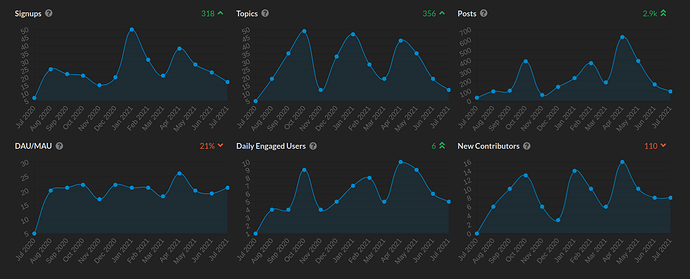Creating a new topic that was triggered by this:
Why did it go nowhere? Let me guess at providing some answers:
- Because the SocialHub community is tiny.
- Because at the time @lanodan was working on this, they were the only one.
- Because the topic scrolled out of view later on, not noticed by the occasional visitor.
- Because too few of the members and people in general think to consult SocialHub and see it as an essential hub for collaboration.
And because of this the community also doesn’t get stronger, as..
So now the knowledge lives fragmented across the web, and may be implemented without others knowing about it.
Another example where a dev is more or less left to their own devices is @grishka with FEP-400e: Publicly-appendable ActivityPub collections (got some good feedback, but mostly from one other dev @macgirvin). And same goes for Querying ActivityPub collections
There are many more examples of this - a forum FULL of open issues like this - and usually the devs involved either go it alone or abandon an idea.
Consequences
This may not be bad for the individual project that raises issues in the community. They just go their own way. But it may be frustrating to - having spent the effort to steer up discussion - see an initiative come to naught. Next time people won’t waste their time, or go elsewhere with their issue.
It is very detrimental to having a well-oiled SocialHub. And it is hampering the evolution of the Fediverse technology foundation and open standards in general.
This whole problem is well-known and e.g. @Sebastian has raised it countless times, as have I (more recently).
On the whole I feel a “Tragedy of the Commons” for the Fediverse looms, where - as we become more fragmented - it becomes harder and harder to stay relevant and keep up with technological developments that occur elsewhere and beyond our control.
Improvements?
As I’ve said in Organizing for SocialHub Community Empowerment I think that people who are actively building this community are needed. People involved in different activities than development, and also willing to do the boring chores that need to be done. There’s a win-win for project devs in it, as their project’s future is also on the line.
Also this community needs to grow, and broaden in diversity. I created Fediverse Futures - SocialHub for this, and wrote an analogy for how we might collaborate: SocialHub and Spiral Island: A Fediverse Foundation Analogy
And I created a website that might be a companion to this forum, for documentation and tracking all the open issues we find here: Presenting Fedi Foundation: Empowerment for SocialHub community
Unfortunately, even for this, there’s little to no interest ![]()
We need to think how we can make community work more interesting for people to get involved with.

